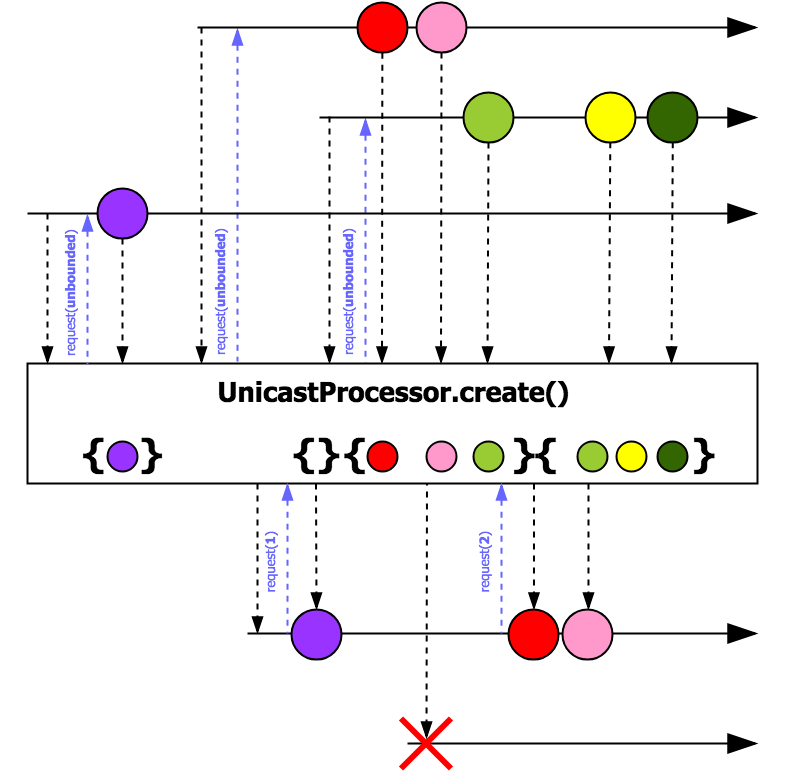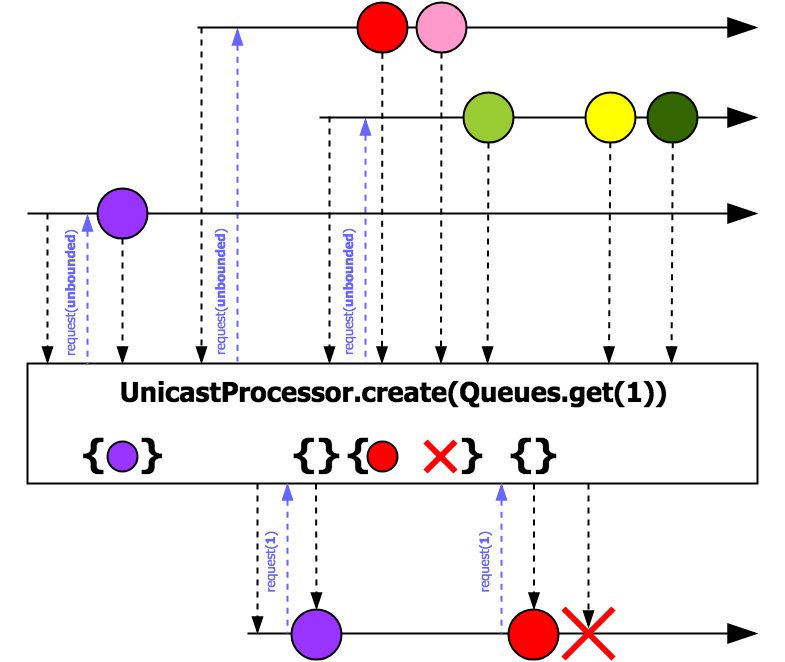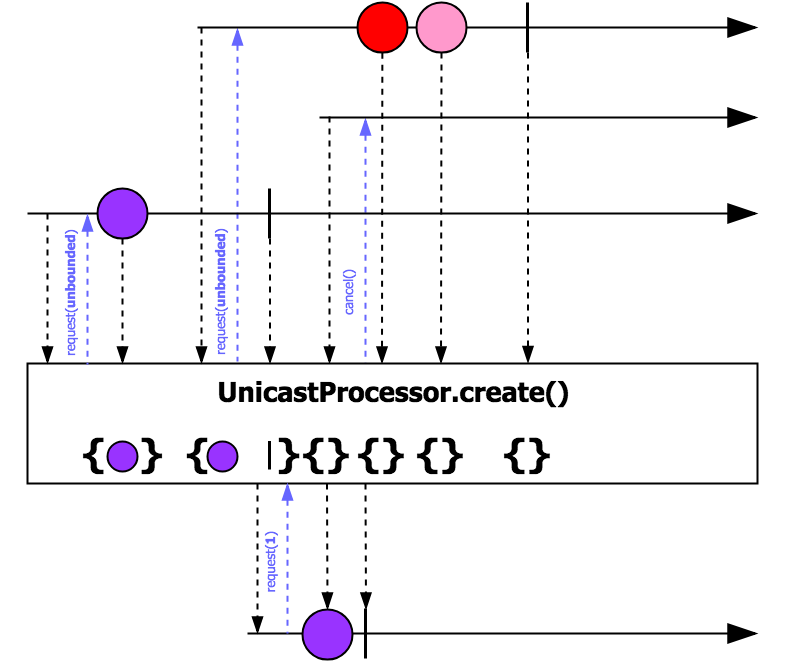- java.lang.Object
-
- reactor.core.publisher.Flux<OUT>
-
- reactor.core.publisher.FluxProcessor<T,T>
-
- reactor.core.publisher.UnicastProcessor<T>
-
- Type Parameters:
T- the input and output type
- All Implemented Interfaces:
- Iterable<T>, Collection<T>, Queue<T>, Processor<T,T>, Publisher<T>, Subscriber<T>, Subscription, CorePublisher<T>, CoreSubscriber<T>, Disposable, Fuseable, Fuseable.QueueSubscription<T>, Scannable
Deprecated.to be removed in 3.5, prefer clear cut usage ofSinksthrough variations underSinks.many().unicast().
@Deprecated public final class UnicastProcessor<T> extends FluxProcessor<T,T> implements Fuseable.QueueSubscription<T>, Fuseable
A Processor implementation that takes a custom queue and allows only a single subscriber. UnicastProcessor allows multiplexing of the events which means that it supports multiple producers and only one consumer. However, it should be noticed that multi-producer case is only valid if appropriate Queue is provided. Otherwise, it could break Reactive Streams Spec if Publishers publish on different threads.
Note: UnicastProcessor does not respect the actual subscriber's demand as it is described in Reactive Streams Spec. However, UnicastProcessor embraces configurable Queue internally which allows enabling backpressure support and preventing of consumer's overwhelming. Hence, interaction model between producers and UnicastProcessor will be PUSH only. In opposite, interaction model between UnicastProcessor and consumer will be PUSH-PULL as defined in Reactive Streams Spec. In the case when upstream's signals overflow the bound of internal Queue, UnicastProcessor will fail with signaling onError( reactor.core.Exceptions.OverflowException).

Note: The implementation keeps the order of signals. That means that in case of terminal signal (completion or error signals) it will be postponed until all of the previous signals has been consumed.

-
-
Nested Class Summary
-
Nested classes/interfaces inherited from interface reactor.core.Fuseable
Fuseable.ConditionalSubscriber<T>, Fuseable.QueueSubscription<T>, Fuseable.ScalarCallable<T>, Fuseable.SynchronousSubscription<T>
-
Nested classes/interfaces inherited from interface reactor.core.Scannable
Scannable.Attr<T>
-
Nested classes/interfaces inherited from interface reactor.core.Disposable
Disposable.Composite, Disposable.Swap
-
-
Field Summary
-
Fields inherited from interface reactor.core.Fuseable.QueueSubscription
NOT_SUPPORTED_MESSAGE
-
Fields inherited from interface reactor.core.Scannable
OPERATOR_NAME_UNRELATED_WORDS_PATTERN
-
-
Constructor Summary
Constructors Constructor and Description UnicastProcessor(Queue<T> queue)Deprecated.UnicastProcessor(Queue<T> queue, Consumer<? super T> onOverflow, Disposable onTerminate)Deprecated.UnicastProcessor(Queue<T> queue, Disposable onTerminate)Deprecated.
-
Method Summary
All Methods Static Methods Instance Methods Concrete Methods Default Methods Deprecated Methods Modifier and Type Method and Description CoreSubscriber<? super T>actual()Deprecated.Flux<T>asFlux()Deprecated.Return aFluxview of this sink.voidcancel()Deprecated.voidclear()Deprecated.static <E> UnicastProcessor<E>create()Deprecated.Create a newUnicastProcessorthat will buffer on an internal queue in an unbounded fashion.static <E> UnicastProcessor<E>create(Queue<E> queue)Deprecated.Create a newUnicastProcessorthat will buffer on a provided queue in an unbounded fashion.static <E> UnicastProcessor<E>create(Queue<E> queue, Consumer<? super E> onOverflow, Disposable endcallback)Deprecated.should not expose onOverflow / remove in a future reactor versionstatic <E> UnicastProcessor<E>create(Queue<E> queue, Disposable endcallback)Deprecated.Create a newUnicastProcessorthat will buffer on a provided queue in an unbounded fashion.ContextcurrentContext()Deprecated.Request aContextfrom dependent components which can include downstream operators during subscribing or a terminalSubscriber.intcurrentSubscriberCount()Deprecated.Get how manySubscribersare currently subscribed to the sink.longdownstreamCount()Deprecated.Return the number of activeSubscriberor -1 if untracked.default voidemitComplete(Sinks.EmitFailureHandler failureHandler)Terminate the sequence successfully, generating anonCompletesignal.default voidemitError(Throwable error, Sinks.EmitFailureHandler failureHandler)Fail the sequence, generating anonErrorsignal.voidemitNext(T value, Sinks.EmitFailureHandler failureHandler)Deprecated.Emit a non-null element, generating anonNextsignal, or notifies the downstream subscriber(s) of a failure to do so viaSinks.Many.emitError(Throwable, Sinks.EmitFailureHandler)(with anoverflow exception).intgetBufferSize()Deprecated.Return the processor buffer capacity if any orInteger.MAX_VALUEThrowablegetError()Deprecated.Current error if any, default to nullintgetPrefetch()Deprecated.The prefetch configuration of theFluxbooleanhasDownstreams()Deprecated.Return true if anySubscriberis actively subscribedStream<Scannable>inners()Deprecated.Return aStreamof referenced inners (flatmap, multicast etc)booleanisDisposed()Deprecated.Optionally return true when the resource or task is disposed.booleanisEmpty()Deprecated.protected booleanisIdentityProcessor()Deprecated.Return true ifFluxProcessor<T, T>booleanisTerminated()Deprecated.Has this upstream finished or "completed" / "failed" ?voidonComplete()Deprecated.voidonError(Throwable throwable)Deprecated.voidonNext(T t)Deprecated.voidonSubscribe(Subscription s)Deprecated.Implementors should initialize any state used bySubscriber.onNext(Object)before callingSubscription.request(long).Tpoll()Deprecated.voidrequest(long n)Deprecated.intrequestFusion(int requestedMode)Deprecated.Request a specific fusion mode from this QueueSubscription.ObjectscanUnsafe(Scannable.Attr key)Deprecated.This method is used internally by components to define their key-value mappings in a single place.intsize()Deprecated.default StringstepName()Return a meaningfulStringrepresentation of thisScannablein its chain ofScannable.parents()andScannable.actuals().voidsubscribe(CoreSubscriber<? super T> actual)Deprecated.An internalPublisher.subscribe(Subscriber)that will bypassHooks.onLastOperator(Function)pointcut.Sinks.EmitResulttryEmitComplete()Deprecated.Try to terminate the sequence successfully, generating anonCompletesignal.Sinks.EmitResulttryEmitError(Throwable t)Deprecated.Try to fail the sequence, generating anonErrorsignal.Sinks.EmitResulttryEmitNext(T t)Deprecated.Try emitting a non-null element, generating anonNextsignal.-
Methods inherited from class reactor.core.publisher.FluxProcessor
dispose, hasCompleted, hasError, isSerialized, serialize, serializeAlways, sink, sink, switchOnNext, wrap
-
Methods inherited from class reactor.core.publisher.Flux
all, any, as, blockFirst, blockFirst, blockLast, blockLast, buffer, buffer, buffer, buffer, buffer, buffer, buffer, buffer, buffer, buffer, buffer, bufferTimeout, bufferTimeout, bufferTimeout, bufferTimeout, bufferUntil, bufferUntil, bufferUntilChanged, bufferUntilChanged, bufferUntilChanged, bufferWhen, bufferWhen, bufferWhile, cache, cache, cache, cache, cache, cache, cancelOn, cast, checkpoint, checkpoint, checkpoint, collect, collect, collectList, collectMap, collectMap, collectMap, collectMultimap, collectMultimap, collectMultimap, collectSortedList, collectSortedList, combineLatest, combineLatest, combineLatest, combineLatest, combineLatest, combineLatest, combineLatest, combineLatest, combineLatest, concat, concat, concat, concat, concatDelayError, concatDelayError, concatDelayError, concatDelayError, concatMap, concatMap, concatMapDelayError, concatMapDelayError, concatMapDelayError, concatMapIterable, concatMapIterable, concatWith, concatWithValues, contextWrite, contextWrite, count, create, create, defaultIfEmpty, defer, deferContextual, deferWithContext, delayElements, delayElements, delaySequence, delaySequence, delaySubscription, delaySubscription, delaySubscription, delayUntil, dematerialize, distinct, distinct, distinct, distinct, distinctUntilChanged, distinctUntilChanged, distinctUntilChanged, doAfterTerminate, doFinally, doFirst, doOnCancel, doOnComplete, doOnDiscard, doOnEach, doOnError, doOnError, doOnError, doOnNext, doOnRequest, doOnSubscribe, doOnTerminate, elapsed, elapsed, elementAt, elementAt, empty, error, error, error, expand, expand, expandDeep, expandDeep, filter, filterWhen, filterWhen, first, first, firstWithSignal, firstWithSignal, firstWithValue, firstWithValue, flatMap, flatMap, flatMap, flatMap, flatMapDelayError, flatMapIterable, flatMapIterable, flatMapSequential, flatMapSequential, flatMapSequential, flatMapSequentialDelayError, from, fromArray, fromIterable, fromStream, fromStream, generate, generate, generate, groupBy, groupBy, groupBy, groupBy, groupJoin, handle, hasElement, hasElements, hide, ignoreElements, index, index, interval, interval, interval, interval, join, just, just, last, last, limitRate, limitRate, limitRequest, log, log, log, log, log, log, map, materialize, merge, merge, merge, merge, merge, merge, mergeDelayError, mergeOrdered, mergeOrdered, mergeOrdered, mergeOrderedWith, mergeSequential, mergeSequential, mergeSequential, mergeSequential, mergeSequential, mergeSequential, mergeSequentialDelayError, mergeSequentialDelayError, mergeSequentialDelayError, mergeWith, metrics, name, never, next, ofType, onAssembly, onAssembly, onBackpressureBuffer, onBackpressureBuffer, onBackpressureBuffer, onBackpressureBuffer, onBackpressureBuffer, onBackpressureBuffer, onBackpressureBuffer, onBackpressureDrop, onBackpressureDrop, onBackpressureError, onBackpressureLatest, onErrorContinue, onErrorContinue, onErrorContinue, onErrorMap, onErrorMap, onErrorMap, onErrorResume, onErrorResume, onErrorResume, onErrorReturn, onErrorReturn, onErrorReturn, onErrorStop, onTerminateDetach, or, parallel, parallel, parallel, publish, publish, publish, publish, publishNext, publishOn, publishOn, publishOn, push, push, range, reduce, reduce, reduceWith, repeat, repeat, repeat, repeat, repeatWhen, replay, replay, replay, replay, replay, replay, retry, retry, retryWhen, sample, sample, sampleFirst, sampleFirst, sampleTimeout, sampleTimeout, scan, scan, scanWith, share, shareNext, single, single, singleOrEmpty, skip, skip, skip, skipLast, skipUntil, skipUntilOther, skipWhile, sort, sort, startWith, startWith, startWith, subscribe, subscribe, subscribe, subscribe, subscribe, subscribe, subscribe, subscribeOn, subscribeOn, subscriberContext, subscriberContext, subscribeWith, switchIfEmpty, switchMap, switchMap, switchOnFirst, switchOnFirst, switchOnNext, switchOnNext, tag, take, take, take, takeLast, takeUntil, takeUntilOther, takeWhile, then, then, thenEmpty, thenMany, timeout, timeout, timeout, timeout, timeout, timeout, timeout, timestamp, timestamp, toIterable, toIterable, toIterable, toStream, toStream, toString, transform, transformDeferred, transformDeferredContextual, using, using, usingWhen, usingWhen, window, window, window, window, window, window, window, windowTimeout, windowTimeout, windowUntil, windowUntil, windowUntil, windowUntilChanged, windowUntilChanged, windowUntilChanged, windowWhen, windowWhile, windowWhile, withLatestFrom, zip, zip, zip, zip, zip, zip, zip, zip, zip, zip, zip, zip, zip, zipWith, zipWith, zipWith, zipWith, zipWithIterable, zipWithIterable
-
Methods inherited from class java.lang.Object
clone, equals, finalize, getClass, hashCode, notify, notifyAll, wait, wait, wait
-
Methods inherited from interface reactor.core.Fuseable.QueueSubscription
add, addAll, contains, containsAll, element, iterator, offer, peek, remove, remove, removeAll, retainAll, toArray, toArray
-
Methods inherited from interface java.util.Collection
equals, hashCode, parallelStream, removeIf, spliterator, stream
-
Methods inherited from interface reactor.core.Scannable
actuals, from, isScanAvailable, name, parents, scan, scanOrDefault, steps, tags
-
-
-
-
Constructor Detail
-
UnicastProcessor
public UnicastProcessor(Queue<T> queue, Disposable onTerminate)
Deprecated.
-
UnicastProcessor
@Deprecated public UnicastProcessor(Queue<T> queue, Consumer<? super T> onOverflow, Disposable onTerminate)
Deprecated.
-
-
Method Detail
-
create
public static <E> UnicastProcessor<E> create()
Deprecated.Create a newUnicastProcessorthat will buffer on an internal queue in an unbounded fashion.- Type Parameters:
E- the relayed type- Returns:
- a unicast
FluxProcessor
-
create
public static <E> UnicastProcessor<E> create(Queue<E> queue)
Deprecated.Create a newUnicastProcessorthat will buffer on a provided queue in an unbounded fashion.- Type Parameters:
E- the relayed type- Parameters:
queue- the buffering queue- Returns:
- a unicast
FluxProcessor
-
create
public static <E> UnicastProcessor<E> create(Queue<E> queue, Disposable endcallback)
Deprecated.Create a newUnicastProcessorthat will buffer on a provided queue in an unbounded fashion.- Type Parameters:
E- the relayed type- Parameters:
queue- the buffering queueendcallback- called on any terminal signal- Returns:
- a unicast
FluxProcessor
-
create
@Deprecated public static <E> UnicastProcessor<E> create(Queue<E> queue, Consumer<? super E> onOverflow, Disposable endcallback)
Deprecated. should not expose onOverflow / remove in a future reactor versionCreate a newUnicastProcessorthat will buffer on a provided queue in an unbounded fashion.- Type Parameters:
E- the relayed type- Parameters:
queue- the buffering queueendcallback- called on any terminal signalonOverflow- called when queue.offer return false and unicastProcessor is about to emit onError.- Returns:
- a unicast
FluxProcessor
-
getBufferSize
public int getBufferSize()
Deprecated.Description copied from class:FluxProcessorReturn the processor buffer capacity if any orInteger.MAX_VALUE- Overrides:
getBufferSizein classFluxProcessor<T,T>- Returns:
- processor buffer capacity if any or
Integer.MAX_VALUE
-
inners
public Stream<Scannable> inners()
Deprecated.Description copied from interface:ScannableReturn aStreamof referenced inners (flatmap, multicast etc)
-
scanUnsafe
public Object scanUnsafe(Scannable.Attr key)
Deprecated.Description copied from interface:ScannableThis method is used internally by components to define their key-value mappings in a single place. Although it is ignoring the generic type of theScannable.Attrkey, implementors should take care to return values of the correct type, and return null if no specific value is available.For public consumption of attributes, prefer using
Scannable.scan(Attr), which will return a typed value and fall back to the key's default if the component didn't define any mapping.- Specified by:
scanUnsafein interfaceScannable- Overrides:
scanUnsafein classFluxProcessor<T,T>- Parameters:
key- aScannable.Attrto resolve for the component.- Returns:
- the value associated to the key for that specific component, or null if none.
-
onComplete
public void onComplete()
Deprecated.- Specified by:
onCompletein interfaceSubscriber<T>
-
tryEmitComplete
public Sinks.EmitResult tryEmitComplete()
Deprecated.Description copied from interface:Sinks.ManyTry to terminate the sequence successfully, generating anonCompletesignal. The result of the attempt is represented as anSinks.EmitResult, which possibly indicates error cases.- Returns:
- an
Sinks.EmitResult, which should be checked to distinguish different possible failures - See Also:
Subscriber.onComplete()
-
onError
public void onError(Throwable throwable)
Deprecated.- Specified by:
onErrorin interfaceSubscriber<T>
-
tryEmitError
public Sinks.EmitResult tryEmitError(Throwable t)
Deprecated.Description copied from interface:Sinks.ManyTry to fail the sequence, generating anonErrorsignal. The result of the attempt is represented as anSinks.EmitResult, which possibly indicates error cases.- Parameters:
t- the exception to signal, not null- Returns:
- an
Sinks.EmitResult, which should be checked to distinguish different possible failures - See Also:
Subscriber.onError(Throwable)
-
onNext
public void onNext(T t)
Deprecated.- Specified by:
onNextin interfaceSubscriber<T>
-
emitNext
public void emitNext(T value, Sinks.EmitFailureHandler failureHandler)
Deprecated.Description copied from interface:Sinks.ManyEmit a non-null element, generating anonNextsignal, or notifies the downstream subscriber(s) of a failure to do so viaSinks.Many.emitError(Throwable, Sinks.EmitFailureHandler)(with anoverflow exception).Generally,
Sinks.Many.tryEmitNext(Object)is preferable since it allows a custom handling of error cases, although this implies checking the returnedSinks.EmitResultand correctly acting on it (see implementation notes).Might throw an unchecked exception in case of a fatal error downstream which cannot be propagated to any asynchronous handler (aka a bubbling exception).
- Parameters:
value- the value to emit, not nullfailureHandler- the failure handler that allows retrying failedSinks.EmitResult.- See Also:
Sinks.Many.tryEmitNext(Object),Subscriber.onNext(Object)
-
tryEmitNext
public Sinks.EmitResult tryEmitNext(T t)
Deprecated.Description copied from interface:Sinks.ManyTry emitting a non-null element, generating anonNextsignal. The result of the attempt is represented as anSinks.EmitResult, which possibly indicates error cases.Might throw an unchecked exception in case of a fatal error downstream which cannot be propagated to any asynchronous handler (aka a bubbling exception).
- Parameters:
t- the value to emit, not null- Returns:
- an
Sinks.EmitResult, which should be checked to distinguish different possible failures - See Also:
Subscriber.onNext(Object)
-
currentSubscriberCount
public int currentSubscriberCount()
Deprecated.Description copied from interface:Sinks.ManyGet how manySubscribersare currently subscribed to the sink.This is a best effort peek at the sink state, and a subsequent attempt at emitting to the sink might still return
Sinks.EmitResult.FAIL_ZERO_SUBSCRIBERwhere relevant. (generally inSinks.Many.tryEmitNext(Object)). Request (and lack thereof) isn't taken into account, all registered subscribers are counted.- Returns:
- the number of subscribers at the time of invocation
-
asFlux
public Flux<T> asFlux()
Deprecated.Description copied from interface:Sinks.ManyReturn aFluxview of this sink. Every call returns the same instance.- Returns:
- the
Fluxview associated to thisSinks.Many
-
isIdentityProcessor
protected boolean isIdentityProcessor()
Deprecated.Description copied from class:FluxProcessorReturn true ifFluxProcessor<T, T>- Overrides:
isIdentityProcessorin classFluxProcessor<T,T>- Returns:
- true if
FluxProcessor<T, T>
-
onSubscribe
public void onSubscribe(Subscription s)
Deprecated.Description copied from interface:CoreSubscriberImplementors should initialize any state used bySubscriber.onNext(Object)before callingSubscription.request(long). Should furtheronNextrelated state modification occur, thread-safety will be required.Note that an invalid request
<= 0will not produce an onError and will simply be ignored or reported through a debug-enabledLogger.- Specified by:
onSubscribein interfaceSubscriber<T>- Specified by:
onSubscribein interfaceCoreSubscriber<T>
-
getPrefetch
public int getPrefetch()
Deprecated.Description copied from class:FluxThe prefetch configuration of theFlux- Overrides:
getPrefetchin classFlux<T>- Returns:
- the prefetch configuration of the
Flux, -1 if unspecified
-
currentContext
public Context currentContext()
Deprecated.Description copied from interface:CoreSubscriberRequest aContextfrom dependent components which can include downstream operators during subscribing or a terminalSubscriber.- Specified by:
currentContextin interfaceCoreSubscriber<T>- Overrides:
currentContextin classFluxProcessor<T,T>- Returns:
- a resolved context or
Context.empty()
-
subscribe
public void subscribe(CoreSubscriber<? super T> actual)
Deprecated.Description copied from class:FluxAn internalPublisher.subscribe(Subscriber)that will bypassHooks.onLastOperator(Function)pointcut.In addition to behave as expected by
Publisher.subscribe(Subscriber)in a controlled manner, it supports direct subscribe-timeContextpassing.- Specified by:
subscribein interfaceCorePublisher<T>- Specified by:
subscribein classFlux<T>- Parameters:
actual- theSubscriberinterested into the published sequence- See Also:
Flux.subscribe(Subscriber)
-
request
public void request(long n)
Deprecated.- Specified by:
requestin interfaceSubscription
-
cancel
public void cancel()
Deprecated.- Specified by:
cancelin interfaceSubscription
-
size
public int size()
Deprecated.- Specified by:
sizein interfaceCollection<T>
-
isEmpty
public boolean isEmpty()
Deprecated.- Specified by:
isEmptyin interfaceCollection<T>
-
clear
public void clear()
Deprecated.- Specified by:
clearin interfaceCollection<T>
-
requestFusion
public int requestFusion(int requestedMode)
Deprecated.Description copied from interface:Fuseable.QueueSubscriptionRequest a specific fusion mode from this QueueSubscription.One should request either SYNC, ASYNC or ANY modes (never NONE) and the implementor should return NONE, SYNC or ASYNC (never ANY).
For example, if a source supports only ASYNC fusion but the intermediate operator supports only SYNC fuseable sources, the operator may request SYNC fusion and the source can reject it via NONE, thus the operator can return NONE as well to downstream and the fusion doesn't happen.
- Specified by:
requestFusionin interfaceFuseable.QueueSubscription<T>- Parameters:
requestedMode- the mode requested by the intermediate operator- Returns:
- the actual fusion mode activated
-
isDisposed
public boolean isDisposed()
Deprecated.Description copied from interface:DisposableOptionally return true when the resource or task is disposed.Implementations are not required to track disposition and as such may never return true even when disposed. However, they MUST only return true when there's a guarantee the resource or task is disposed.
- Specified by:
isDisposedin interfaceDisposable- Returns:
- true when there's a guarantee the resource or task is disposed.
-
isTerminated
public boolean isTerminated()
Deprecated.Description copied from class:FluxProcessorHas this upstream finished or "completed" / "failed" ?- Overrides:
isTerminatedin classFluxProcessor<T,T>- Returns:
- has this upstream finished or "completed" / "failed" ?
-
getError
@Nullable public Throwable getError()
Deprecated.Description copied from class:FluxProcessorCurrent error if any, default to null- Overrides:
getErrorin classFluxProcessor<T,T>- Returns:
- Current error if any, default to null
-
actual
public CoreSubscriber<? super T> actual()
Deprecated.
-
downstreamCount
public long downstreamCount()
Deprecated.Description copied from class:FluxProcessorReturn the number of activeSubscriberor -1 if untracked.- Overrides:
downstreamCountin classFluxProcessor<T,T>- Returns:
- the number of active
Subscriberor -1 if untracked
-
hasDownstreams
public boolean hasDownstreams()
Deprecated.Description copied from class:FluxProcessorReturn true if anySubscriberis actively subscribed- Overrides:
hasDownstreamsin classFluxProcessor<T,T>- Returns:
- true if any
Subscriberis actively subscribed
-
stepName
public String stepName()
Description copied from interface:ScannableReturn a meaningfulStringrepresentation of thisScannablein its chain ofScannable.parents()andScannable.actuals().
-
emitComplete
public void emitComplete(Sinks.EmitFailureHandler failureHandler)
Description copied from interface:Sinks.ManyTerminate the sequence successfully, generating anonCompletesignal.Generally,
Sinks.Many.tryEmitComplete()is preferable, since it allows a custom handling of error cases.- Specified by:
emitCompletein interfaceSinks.Many<T>- Parameters:
failureHandler- the failure handler that allows retrying failedSinks.EmitResult.- See Also:
Sinks.Many.tryEmitComplete(),Subscriber.onComplete()
-
emitError
public void emitError(Throwable error, Sinks.EmitFailureHandler failureHandler)
Description copied from interface:Sinks.ManyFail the sequence, generating anonErrorsignal.Generally,
Sinks.Many.tryEmitError(Throwable)is preferable since it allows a custom handling of error cases, although this implies checking the returnedSinks.EmitResultand correctly acting on it (see implementation notes).- Specified by:
emitErrorin interfaceSinks.Many<T>- Parameters:
error- the exception to signal, not nullfailureHandler- the failure handler that allows retrying failedSinks.EmitResult.- See Also:
Sinks.Many.tryEmitError(Throwable),Subscriber.onError(Throwable)
-
-